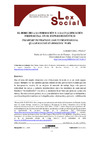Please use this identifier to cite or link to this item:
https://accedacris.ulpgc.es/jspui/handle/10553/77068
| Title: | El derecho a la formación y a la cualificación profesional en el empleo doméstico | Other Titles: | The right to training and to professional qualification in domestic work | Authors: | Grau Pineda, María Del Carmen | UNESCO Clasification: | 560507 Derecho público 560504 Derecho constitucional |
Keywords: | Empleo doméstico Hogar familiar Cuidados Formación y cualificación Domestic service, et al |
Issue Date: | 2021 | Journal: | Lex Social: Revista de Derechos Sociales | Abstract: | Que el tema del empleo doméstico este últimamente de moda no es en modo alguno casual. Múltiples son las variables que han influido en ello, pero es fácil entender que con la incorporación masiva de las mujeres al mercado de trabajo haya sido preciso redistribuir las tareas y cuidados intrafamiliares entre los miembros de cada unidad familiar o “externalizarlos” y acudir a la prestación de servicios por personas ajenas a la misma. En este contexto general, es de gran utilidad revisar el papel que la formación y cualificación profesional tiene en la dignificación, valorización y, por tanto, visibilización de este trabajo, de este sector y de un colectivo de trabajadoras vulnerables como pocos. Y, para llevar a cabo tal labor, ha decidido estructurarse esta aportación intentando dar respuesta a tres preguntas concretas: ¿Por qué es el sector de empleo doméstico un sector emergente?, ¿existe un derecho laboral a la formación profesional para este colectivo?, ¿de qué formación se dispone, por qué no se demuestra eficaz y quién es el responsable de ello? That the issue of domestic work is lately in fashion is by no means casual. There are multiple variables that have influenced this, but it is easy to understand that with the massive incorporation of women into the labor market it has been necessary to red istribute tasks and intrafamily care among the members of each family unit or to “outsource” them and go to the provision of services by outsiders. In this general context, it is important to review the role that professional training and qualification has in the dignity, valorization and, therefore, visibility of this work, of this sector and of a group of vulnerable workers as few. And, to carry out this work, it has decided to structure this contribution trying to answer three specific questions: Why is the sector an emerging sector of domestic employment? Is there a labor right to vocational training? What training is available, why is it not given importance and who does not? |
URI: | https://accedacris.ulpgc.es/handle/10553/77068 | ISSN: | 2174-6419 | DOI: | 10.46661/lexsocial.5425 | Source: | Lex Social: Revista de Derechos Sociales [ISSN 2174-6419], v. 11 (1), p. 474–508 |
| Appears in Collections: | Artículos |
Page view(s) 10
121
checked on Jan 10, 2026
Download(s)
41
checked on Jan 10, 2026
Google ScholarTM
Check
Altmetric
Share
Export metadata
Items in accedaCRIS are protected by copyright, with all rights reserved, unless otherwise indicated.
